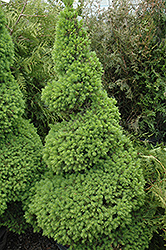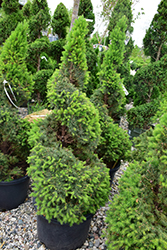Dwarf Alberta Spruce
Picea glauca 'Conica (spiral)'
Height: 6 feet
Spread: 24 inches
Sunlight:
![]()
![]()
Hardiness Zone: 4
Description:
A dwarf evergreen sheared to a spiral form making a dazzling accent, requires annual pruning to keep in form; ideal as a garden accent; incredibly dense needles are very sensitive to winter burn and may need winter protection in exposed locations
Ornamental Features
Dwarf Alberta Spruce is a dwarf conifer which is primarily valued in the landscape or garden for its rigidly columnar form. It has rich green evergreen foliage which emerges light green in spring. The needles remain green throughout the winter.
Landscape Attributes
Dwarf Alberta Spruce is a dense multi-stemmed evergreen shrub with a narrowly upright and columnar growth habit. It lends an extremely fine and delicate texture to the landscape composition which can make it a great accent feature on this basis alone.
This is a relatively low maintenance shrub. When pruning is necessary, it is recommended to only trim back the new growth of the current season, other than to remove any dieback. It has no significant negative characteristics.
Dwarf Alberta Spruce is recommended for the following landscape applications;
- Accent
- General Garden Use
Planting & Growing
Dwarf Alberta Spruce will grow to be about 6 feet tall at maturity, with a spread of 24 inches. It has a low canopy, and is suitable for planting under power lines. It grows at a slow rate, and under ideal conditions can be expected to live for 50 years or more.
This shrub does best in full sun to partial shade. It prefers to grow in average to moist conditions, and shouldn't be allowed to dry out. It is not particular as to soil type or pH. It is somewhat tolerant of urban pollution, and will benefit from being planted in a relatively sheltered location. Consider applying a thick mulch around the root zone in winter to protect it in exposed locations or colder microclimates. This is a selection of a native North American species.

